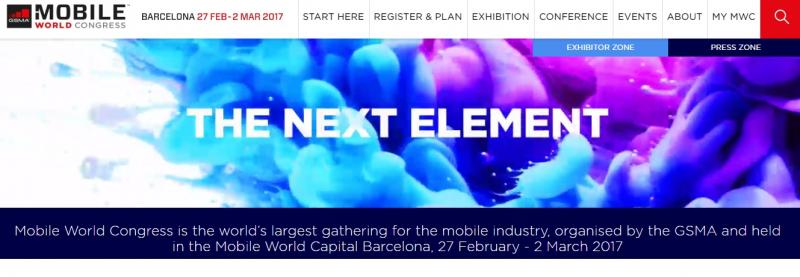What To Expect From Mobile World Congress 2017

It's that time of year again! From next Monday (February 27) through March 2, 2017, Mobile World Congress (MWC) will take place in Barcelona. I attended this event (then 3GSM) for the first time in 2005 and it is fascinating to see how the event has morphed from a B2B telecoms technology trade show to one of the largest business conferences around the globe. This year’s MWC theme is “The Next Element” which may seem broad but I quite like this idea that mobile is elemental and has become part of our daily lives. By analogy with the previous industrial revolution, mobile is like electricity: once you have access to it, it is a disruptive enabler of adjacent technologies powering more powerful innovation. Mobile is barely entering its teenage years.
Consumers now use mobile as a sixth sense. If the human senses serve as effortless faculties through which we access information on the world around us, then mobile has become the sixth sense. It brings digital to consumers in their daily lives. It has truly become the face of digital. That’s the main challenge for marketers: as mobile becomes the primary interface between your brand and your customers, you must leverage mobile to accelerate digital transformation and transform the customer experience you deliver. A lot has to happen behind the scenes for marketers to be able to deliver real-time contextual experiences on mobile. That’s why it makes a lot of sense for marketers to spend time in Hall 8.1 where most marketing, advertising and app vendors will be gathered.
Of course, we will hear a lot (too much) about 5G. I agree with my colleague Dan Bieler (see his take here on what to expect from MWC from an enterprise angle) that MWC visitors should not get dragged into technology debates regarding LTE-A or 5G. It will take at least 5 years before 5G even reaches critical mass stage once launched first by a telco before the end of the decade, likely in South Korea for the Winter Olympics. Of course, we will hear a lot (too much) about new smartphones. However, don’t expect strong innovation on smartphones’ hardware.
This year, we will hear a lot more about IoT, VR and AR, Bots, intelligent agents, robotics and artificial intelligence. The question is not whether these technologies will replace mobile but how mobile will activate them at scale in the years to come. The reality is that mobile is the glue that will stick together multiple connected worlds: smart cities, connected cars, connected homes and workplaces.
You can follow me on Twitter during the event via @Thomas_Husson.
If you are interested in listening to Forrester’s take on the event, Forrester will host a Webinar on March 14 to put key announcements in the context of key 2017 mobile trends. You can register for the Webinar here.
